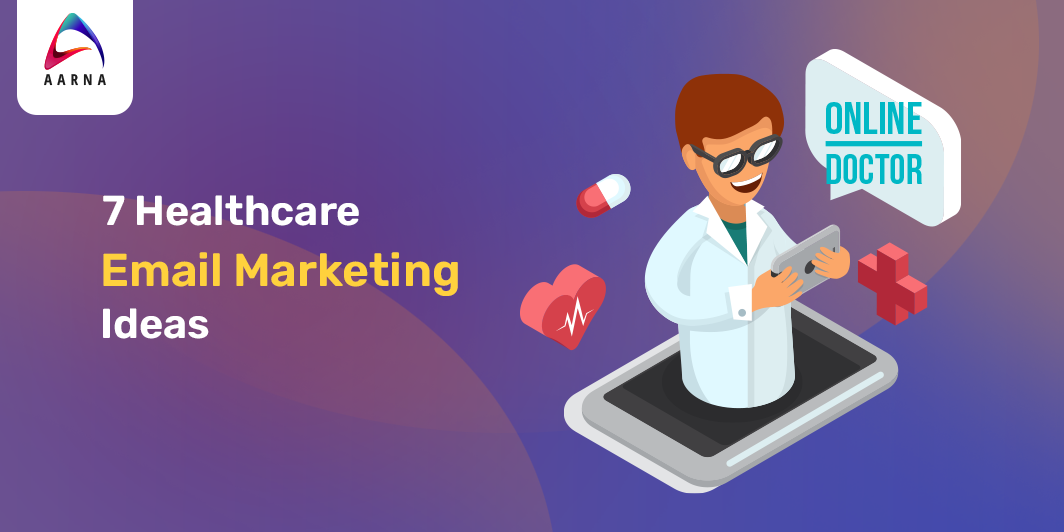
Healthcare email marketing is a powerful tool that can help healthcare providers and institutions engage with their patients and grow their practice. In this article, we’ll explore 7 actionable healthcare email marketing strategies that can help you make the most of this unique marketing channel.
Why You Should Consider Email Marketing for Healthcare?
Email marketing for healthcare is an essential marketing channel for healthcare providers who want to stay connected with their patients and inform them about important healthcare information. It enables healthcare organizations to send personalized emails to their patients, helping them feel more connected and cared for. Patients who receive timely and relevant emails are more likely to trust their healthcare providers and seek medical assistance when needed.
Moreover, email marketing can help healthcare institutions establish their brand and credibility, while also giving them the opportunity to showcase their expertise in their field. By consistently providing valuable information and support via email, healthcare providers can encourage their patients to continue choosing their healthcare organization for their medical needs.
How does Healthcare Email Marketing Drives Engagement?
Healthcare email marketing can significantly improve patient engagement within the healthcare sector. By sending relevant and timely emails, healthcare professionals can educate their patients about various health topics and encourage them to be proactive with their health. In turn, this can lead to better patient outcomes and help build a stronger relationship between the healthcare organization and its patients.
Furthermore, healthcare email marketing can help organizations drive patient loyalty and increase the likelihood of word-of-mouth referrals. When patients feel valued and cared for, they are more likely to recommend their healthcare provider to friends and family.
Why Healthcare Email Marketing is Important for Your Practice?
Email communications play a crucial role in maintaining a strong relationship with your patients. Through healthcare email marketing, you can effectively share important healthcare information, updates, and promotions with your patients. This can help you stay top-of-mind with your patients and encourage them to turn to you when they need medical assistance.
In addition, healthcare email marketing can help your practice improve patient retention and attract new patients. By delivering valuable content and staying in touch with your patients, you can nurture long-term relationships and foster a sense of trust and loyalty.
4 Benefits of Healthcare Email Marketing You Must Know
- Personalization: Healthcare email marketing allows you to send personalized emails to your patients, helping you cater to their individual needs and preferences. This can lead to better patient engagement and satisfaction.
- Cost-effective: Email marketing for healthcare is a cost-effective way to reach your target audience. By sending targeted emails, you can ensure that your marketing efforts have a high return on investment.
- Automation: Email automation can help streamline your healthcare organization’s communication efforts. For example, you can set up automated emails to be sent out on specific dates or when certain triggers are met, such as a patient’s birthday or appointment reminder.
- Improved patient retention: By consistently providing valuable information and support via email, you can encourage your patients to continue choosing your healthcare organization for their medical needs.
7 Actionable Healthcare Email Marketing Strategies
1. Build and segment your email list
Collect email addresses from your patients and segment them based on their preferences, demographics, and medical history. This will help you send targeted and relevant emails. You can acquire email addresses through various means, such as:
- Asking for them during patient registration or appointments
- Offering valuable content, like ebooks or webinars, in exchange for email addresses
- Adding an email sign-up form on your website or social media profiles
Once you have built your email list, segment it into different groups based on factors such as age, gender, medical conditions, and interests. This way, you can tailor your email content to suit the needs and preferences of each group and increase the effectiveness of your email marketing campaign.
2. Send welcome emails
Automatically send a welcome email to new patients to make them feel valued and appreciated. A welcome email can include:
- A warm and friendly greeting
- An introduction to your healthcare practice and staff
- A summary of the services you offer
- Relevant articles, videos, or other resources that can help educate and empower your patients
- A call-to-action (CTA), such as scheduling an appointment, downloading a patient information booklet, or following your practice on social media
3. Share informative content
Provide valuable healthcare content, such as blog posts, articles, and videos, to educate your patients and help them manage their health. This can include:
- Tips for maintaining a healthy lifestyle
- Information about specific medical conditions and treatments
- Updates on the latest healthcare research and advancements
- Patient success stories and testimonials
- Answers to frequently asked questions
By providing your patients with helpful and engaging content, you can position your healthcare organization as a trusted resource and encourage patients to take control of their health.
4. Promote events and webinars
Use email marketing to promote healthcare events and webinars, encouraging your patients to participate and learn more about their health. Events and webinars can cover a variety of topics, such as- Disease prevention and management
- Mental health and wellness
- Nutrition and exercise
- Medical procedures and treatments
In your email invitation, include information about the event or webinar, such as the date, time, location (if applicable), and a brief description of the topic. Be sure to also provide a clear call-to-action, like registering for the event or signing up to attend the webinar.
5. Send appointment reminders
Improve appointment attendance by sending email reminders to your patients. These reminders can help reduce no-shows and last-minute cancellations, ultimately saving your practice time and resources.
Appointment reminder emails should be sent a few days before the scheduled appointment and should include:
- The date and time of the appointment
- The name of the healthcare provider the patient will be seeing
- The location of the appointment (including directions, if necessary)
- Any necessary instructions, such as fasting before a blood test or bringing specific documents
You can also leverage email marketing to send follow-up emails after an appointment, thanking patients for their visit and asking for feedback to improve your services.
6. Celebrate milestones
Acknowledge important events, such as birthdays and anniversaries, with personalized emails to make your patients feel special. A birthday or anniversary email can include:
- A warm and heartfelt message congratulating the patient on their milestone
- A special offer, such as a discount on a service or a complimentary gift
- A reminder to schedule an annual check-up or routine screening
By recognizing these significant moments in your patients’ lives, you can build a stronger connection with them and demonstrate that you truly care about their well-being.
7. Ask for feedback
Use email to gather feedback and reviews from your patients, helping you improve your healthcare services and patient satisfaction. Patient feedback can provide valuable insights into areas where your practice excels and where improvements can be made.
In your feedback request email, consider including:
- A brief message expressing your appreciation for the patient’s recent visit and asking for their feedback
- A link to an online survey or review site where the patient can share their thoughts
- An incentive, such as a discount or entry into a prize draw, to encourage patients to complete the survey
Be sure to analyze the feedback you receive and implement changes as necessary to continually enhance the patient experience.
Healthcare email marketing is a powerful tool for healthcare institutions and providers to engage with their patients and provide valuable information. By implementing the strategies outlined above, you can make the most of this marketing channel and ultimately improve the quality of care you provide to your patients.
As you plan and execute your healthcare email marketing campaign, keep in mind the importance of adhering to privacy regulations, such as the Health Insurance Portability and Accountability Act (HIPAA) in the United States. Ensure that your email marketing practices comply with these regulations to safeguard your patient’s sensitive health information.
With a well-crafted and strategic healthcare email marketing plan, you can foster stronger relationships with your patients, position your organization as a trusted healthcare resource, and ultimately enhance the overall patient experience.

